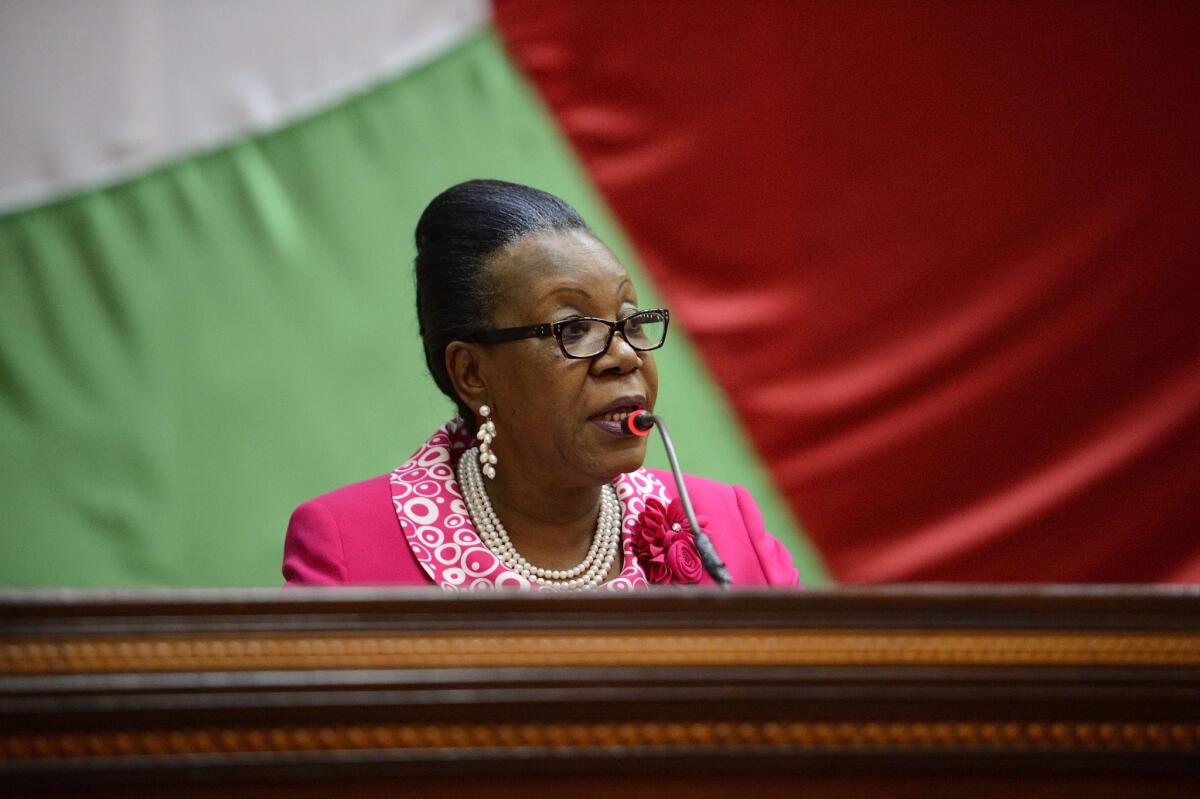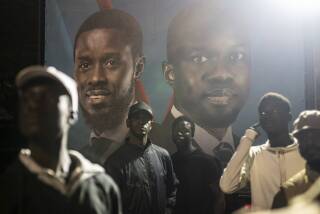First woman to lead Central African Republic faces daunting task

JOHANNESBURG, South Africa - Lawmakers in the Central African Republic on Monday elected the country’s first female leader, Catherine Samba-Panza, as interim president to take on the daunting job of halting sectarian killings, stabilizing a paralyzed country and ushering in elections.
Samba-Panza, a French-educated businesswoman who has been serving as mayor of the country’s capital, Bangui, emerged ahead of seven other candidates, including the sons of two former presidents, after a speech pledging to reconcile the country’s divisions, restore security and rebuild the collapsed state.
The political change, coupled with pledges Monday from the European Union to send 1,000 extra soldiers and nearly $500 million in aid, offered the country its best hope in months at overcoming the chaos and violence that have prevailed since the ousting of former President Francois Bozize by rebels last March.
Samba-Panza’s election follows the resignation of former rebel leader Michel Djotodia as interim president 10 days ago. As head of the largely Muslim Seleka rebels, he seized power to become the first Muslim president in a country whose population is 85% Christian. He disbanded the Seleka rebels but failed to stop lootings, killings and sectarian violence between ex-Seleka forces and largely Christian militias and vigilantes known as the anti-balaka forces.
Samba-Panza, a Christian, was appointed by Djotodia as Bangui mayor last year. In a hopeful sign, her election as interim president was welcomed by a spokesman for the anti-balaka forces, Reuters reported. Anti-balaka forces had earlier threatened violence over the vote.
Peter Bouckaert, director of emergencies at Human Rights Watch, said Samba-Panza’s election is “a step in the right direction,” calling her a courageous voice for reconciliation and peace. He called for those who have committed crimes against humanity to be held accountable, including leaders of the anti-balaka forces, many of whom are vigilante groups outside any formal chain of command.
In comments on Twitter, Bouckaert said Samba-Panza’s first message to both sides should be to stop the killings and to issue a warning that those who had committed atrocities would face justice.
This past weekend saw a new surge of violence, particularly in the northwest of the country, where dozens were killed, according to humanitarian agencies.
International Committee of the Red Cross staff visited communities in the region between Friday and Sunday, when 60 people were buried, a spokeswoman for the ICRC Bangui office, Nadia Dibsy, said in a phone interview Monday.
“There’s a lot of violence taking place between communities, particularly in the northwest. We are extremely concerned about the fact that the population is generally without protection,” she said. “It’s a very difficult situation, and it’s important for us to insist on the fact that such violence must end.”
The deputy head of the U.N.’s Office for the Coordination of Humanitarian Affairs in Bangui, Amy Martin, said by phone that the recent surge of violence mainly involved anti-balaka fighters taking revenge on Muslim communities, whom they blame for the earlier suffering they endured at the hands of the Seleka rebels.
“We have had clashes between ex-Seleka and anti-balaka as well as the targeting of Muslim people. This past weekend we have seen clashes which left many people dead, people displaced, or taking revenge,” Martin said.
“We have different types of violence happening, and it’s hard to predict where the next attack will happen,” she added. “The country is in economic paralysis, the country is in political paralysis, as well as this state of insecurity.”
Some 1,000 people died in violence last month and more than 900,000 people -- 20% of the 4.5 million population -- have fled their homes, nearly half a million of them sheltering in the capital. Thousands of others are hiding in the forests in rural areas.
Many Muslims desperate to flee the country to escape revenge attacks after Djotodia’s resignation have been attacked on the roads and killed, according to humanitarian agencies and media reports.
More than 4,000 African forces and 1,600 French troops are currently deployed in the Central African Republic but have been unable to protect sections of the population, particularly in volatile rural areas far from the capital. EU foreign ministers agreed Monday to send an extra 1,000 troops to help stabilize the country.
The EU also agreed at a separate humanitarian meeting in Brussels Monday to send nearly $500 million to help stabilize the Central African Republic and address pressing humanitarian needs, according to Kristalina Georgieva, EU Commissioner for International Cooperation, Humanitarian Aid and Crisis Response.
“Central Africans are enduring a major humanitarian tragedy and their suffering is truly appalling,” she said in a statement. “The international humanitarian community assembled in Brussels today is determined to reinforce assistance and provide urgently needed aid to the most vulnerable,” she said in the statement.
U.N. Emergency Relief Coordinator Valeria Amos said in a statement that the crisis was one of the world body’s most pressing emergencies, with agencies delivering help as fast as security conditions allow.
“I am deeply disturbed by the impact of the crisis on ordinary people in CAR. The brutality, violence and sectarian nature of the crisis concerns us all,” Amos said.
With thousands of farmers in hiding, unable to buy seeds or plant crops, fears are growing that the humanitarian crisis could worsen in coming months. The World Food Program announced Monday that it was running out of food to assist displaced people. Thirty-eight of its trucks are marooned at the Cameroon border because of fighting in the Central African Republic. It was considering airlifting food into the country.
“The impact on food supplies to the capital and the rest of the country is disastrous. [World Food Program] cereal stocks are close to being exhausted,” the statement said.
The U.N. High Commissioner for Human Rights, Navi Pillay, told a session of the U.N. Human Rights Council that Seleka rebels, anti-balaka forces, Muslim and Christian civilians had all committed atrocities. She said that when French forces disarmed ex-Seleka rebels, it appeared to have left Muslim communities vulnerable to revenge attacks.
She said a U.N. human rights mission sent last month to investigate abuses found evidence of “targeted killings, shooting at displacement sites, summary executions, mutilation and enforced disappearances.”
She added: “The mission received consistent, credible testimony and photographs supporting allegations that anti-balaka mutilated Muslim men, women and children, before or after they were killed, including upon the breasts of female victims and genitals of male victims. Bodies were found at the Ali Babolo mosque with limbs cut off.”
She said there were documented cases of sexual violence, including rape and sexual slavery, by both sides, but mostly by ex-Seleka.
“The security situation remains highly volatile,” she said, “with upsurges of sectarian violence and an increase in opportunistic criminality. The humanitarian situation continues to be a major concern.”
Twitter: @latimesdixon
robyn.dixon@latimes.com
More to Read
Start your day right
Sign up for Essential California for news, features and recommendations from the L.A. Times and beyond in your inbox six days a week.
You may occasionally receive promotional content from the Los Angeles Times.






